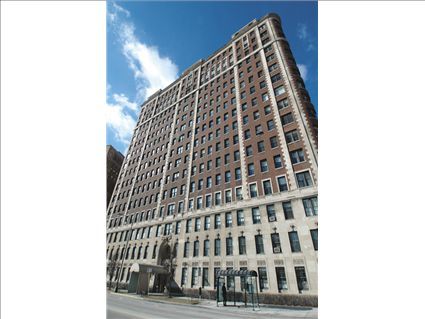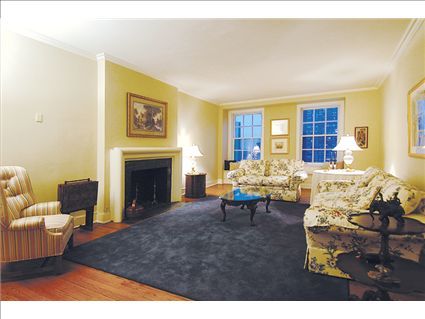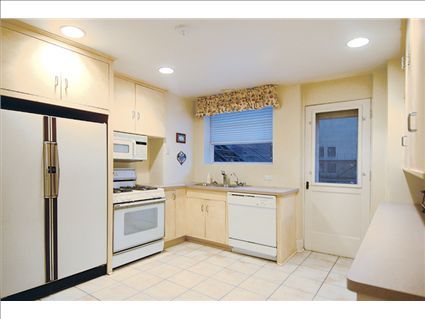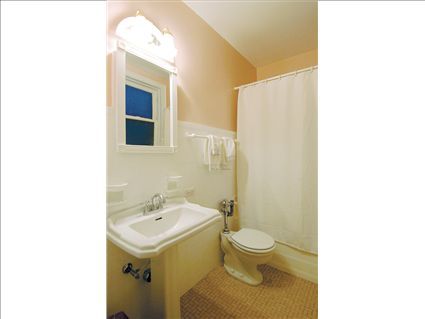Vintage Below $225k on The Drive: 3750 N. Lake Shore Drive
We’ve chattered about some enormous spaces in older vintage buildings before.

This 2-bedroom unit in 3750 N. Lake Shore Drive, a 1926 vintage building in Lakeview, isn’t as spacious as some of the others, but it’s not exactly “small” either.
It is 1600 square feet and here are the room sizes:
- Living room: 25×14
- Dining room: 17×14
- Kitchen: 13×11
- Bedroom #1: 17×12
- Bedroom #2: 16×10
The building is a co-op. Yes, it has a large assessment which, in this case, pays for heat, cable and real estate taxes.
Here’s the listing:
RARELY AVAIL HIGH FLOOR 2BR, 2 BATH COOP W/UNOBSTRUCTED LIGHT ON 3 EXPOSURES. SPACIOUS LAYOUT W/SEPARATE DINING ROOM ENSUITE BEDROOMS.
UPDATED BATHS. OAK FLOORS. DOORMAN, EXERCISE ROOM, INDOOR POOL, SUNDECK W/GRILLS & STORAGE. LEASED PARKING OPTIONS CLOSE BY. ASSMT INCLUDES HEAT, CABLE REAL ESTATE TAXES. W/D ALLOWED.
Also from the listing (in case you were wondering about other expenses):
Both baths have been updated. The south bath includes marble tile and recessed lighting. The vintage tile in the north bath has been re-glazed, and a new pedestal sink, medicine cabinet and lighting were added.
A building-wide window replacement is planned. Nine windows have been replaced within the unit and five more need replacing. The seller will pay for the replacement of the remaining five windows.



Jennifer Ames at Coldwell Banker has the listing. (More pictures and a virtual tour available here.)
Unit #15H: 2 bedrooms, 2 baths, 1600 square feet
- I couldn’t find any prior sales information
- Currently listed at $219,000
- Assessments of $1,685
- Taxes of $4,709
- No central air- window units
- Board approval required
- 90% financing accepted
- No dogs or cats permitted
- Parking available nearby
I have viewed units in this building before, and the unit you feature is comparable, though slightly inferior, to similar rentals I’ve had.
It sounds cheap, but you must have a substantial downpayment, and you will be closely scrutinized by the board.
This is a co-op with extremely high maintenance and with a board that is very difficult to get along with. The No Pets rule speaks for itself. There are 11 elevator tiers, which really runs the maintenance costs. There’s a beautiful indoor pool.
Have a couple of friends who’ve owned larger units at this building, which they found very difficult to unload. Their assessment: great apt. lousy building.
I do like this apt, though.
Can someone explain to me whether or not your assessments in a COOP such as this building are tax deductible? It seems to me that at least a portion of the assessment would be a write-off because it is going to real estate taxes.
thanks.
Man, those assessments are killer.
A no pets clause is a dealbreaker for me and anyone I know, too. Weighing those two factors, it’s not hard to imagine owners would have a hard time selling units, even in Boom Times.
Why are co-op assessments always so high? Does it cover the real estate taxes for the unit too (so you don’t pay into escrow)? If not, where does all that money go?
In addition to Jason R’s question….
I would be interested in knowing if Chicago taxes co-ops less than condos (and if so, generally by how much?). In NYC, property taxes on co-ops are generally lower than condos. But then Chicago’s not a major co-op town like NYC and it’s not exactly easy for Chicagoans to understand how co-ops work.
The apartment is beautiful, and having a wood burning fireplace is a HUGE plus. Ditto for inheriting an old kitchen that hasn’t been remuddled with the “it kitchen” of the day (I hate cherry cabs & bad home depot fixtures). Judging from the decor, I’m betting it’s an estate issue where the executors or the POA’s need the money fast to pay the nursing home tab.
No dogs or cats ??? C’mon! This factor alone alienates this apartment from would be affluent buyers. It also gives you a good idea of how overbearing the board must be. There’s a reason I would never willingly live with my grandparents.
It appears to me as if Chicago’s Co-ops are way out of touch with the reality of today’s market. Prime Example: The restrictions on dog sizes and pets in general. It makes perfect sense to restrict vicious breeds for insurance purposes, and it makes sense to restrict the numbers of pets beyond 2 (nobody wants a cat collector next door). But the fact of today’s market is that many affluent urban buyers prefer big dogs. And tiny dogs are generally much louder and more prone to biting people than the larger dogs.
I understand the monthly assessments being high compared to condos, but then I also wonder what if anything the co-ops are doing to keep the assessments as low as possible (or if they even care to keep them low). Not to mention whether or not they’re being managed with business savvy & financial competence.
Many of NYC’s co-ops have enacted utility metering for individual units, which makes sense for more reasons than I need to post here. Knowing that the co-op residents are generally older, I’m not sure I’d want to pay $2400/mo so Miriam upstairs from me can crank the heat to 80 all winter.
The board at 3750 has a reputation for being EXTREMELY overbearing.
The only thing good to say about that is that a buyer knows that his neighbors are financially well-qualified to own here, and that there is little likelihood of getting slammed with thousands of dollars each because of unpaid expenses owed by foreclosed units. No, that will not happen here.
But special assessments can and will happen, and they can be huge. Remember, this place has a double-height pool room (energy guzzler) and 11 elevator tiers. The worst maintenance sinks, from what I have heard in the past, are the fireplace flues. Insurance is much higher in highrises with woodburning fireplaces, remember. They’re beautiful but they are major pains in the neck that add greatly to the cost of running the building.
Buyer beware. Just vet this building as carefully as its board will vet you.
Those assessments are ridiculous! That is as much or more than the mortgage payment would be. Are comps in the area going for more than twice as much as this unit? They’d have to be for that price to make any sense. And even then you’d still never see more than half of your mortgage go to equity, and put up with the co-op board!
I live in a co-op. We get a prorated (by shares) list of how much real estate tax each individual unit “paid,” and we can deduct that. If we itemize, of course.
Laura, this building has a down payment requirement of 10%.
Mike, I LOVE buildings that refuse pets. I’m allergic, and they are noisy and smelly. Plus, although 90% of the owners (such as, i’m certain, yourself) are never a problem, the 10% of owners who are a problem really reduce the quality of life for everyone in the building.
bubbleboi,
How about buildings that allow indoor-only cats (and puts a cap on the number allowed)? It seems to me that an indoor cat can only do damage to the unit owner’s property. And allowing indoor cats means you can sell to a larger group of buyers.
Dog restrictions/bans, I totally get. Like you say, it only takes one in 50 terrible owners to make their neighbors miserable. But cats? I’ve never understood restrictions on cats. (If I were a landlord and the place was a rental, it would be a very different story.)
And and two stories about dogs in buildings. Story one: I lived in a three flat where the renter above me had a dog, but he just let the dog shit in the house when he didn’t feel like taking it for a walk (which was pretty much always), and when he did let out it out to pee, it was often into the stairwell.
Story two: Just a few months ago I met a woman who let her dog pee on the decked balcony when she didn’t feel like taking it out for a walk. I asked her whether that was doing damage to the balcony, or was dripping to the balconies below, or caused an unpleasant smell for other people using their own balconies. She looked at me blankly, and admitted she had genuinely never thought about it. Whenever it rained, she figured the balcony was getting cleaned naturally.
kenworthy – you are right about cats – i guess there’s no harm there. although i hate to open the door one little crack, because how about birds? snakes? rodents (anyone ever hear of rats as pets?)? My former roommate bought two male hamsters (without my permission), or so she was told buy the pet store, and before you know it they were reproducing and it didn’t take long for one to escape into the house when she took it out to pet it. never got it back – maybe it had more babies in the wall – who knows, i moved out.
and that balcony story is DISGUSTING!!!!!! exactly what i’m talking about with clueless owners. She doesn’t think that the sh*t juice might drip onto the balcony furniture of those below her. I’ll think twice before i site on anyone’s balcony furniture
I was told by someone that the cat restriction has to do with how people dispose of the kitty litter. I guess some people just dump it down the garbage shoot without putting it in a bag. It seems stupid to restrict cats based on that though considering people can also dump other random things down the chute as well.
If boards are allowed to resctrict dogs, they should also be allowed to restrict babies and children. I would take hundreds of barking dogs over one crying baby.
Jenny, you might be right in spirit, but the law says that’s a no-no. 🙂
If that really is the reason for the cat restriction, it is outdated–everyone I know uses “scoopable” litter these days. The disposal issue is minor. Unless some moral decides to flush the… ummm… pieces down the toilet. But even though the Board cannot ban old/young people, they can surely ban stupid people.
to me, a no-pets policy adds 10% to the value of the unit. period.
For $2100/month in Lakeview you can rent a 2/2. Why tie up 220k?
Also this unit is scary. That bathroom looks gross and this place just looks eerie.
i have lived in two condos; one for 10 years in the burbs; another in river north for 9 years now. i have experienced the dog shit and pee on the balcony in both my condos. i had to have the police deal with it in the burbs. in the city, my condo board, after many months, finally fined the woman who let her large greyhound do his stuff on the balcony. she paid the $500. didn’t stop. then a fine for $1500. finally, she moved to London. god knows what happened to the dog. dogs do not belong in condo buildings. Period.
ps
i live on a higher floor and can see several buildings’ balconies from my condo. it is not at all uncommon for people to allow there dogs (and cats) to urinate and deficate on their balconies. it’s disgusting.
Cats wouldn’t do that unless you had a litter pan out there, in which case it’s not disgusting. Maybe from your vantage you can’t see the litter box. I stand by my no-dogs but indoor-only, 2-cat max rule (which I think improves the value of a place)!
But John 2, you are right. It’s amazing how lightly some (probably relatively few, but enough to be infuriating) people take owning a pet. And it’s amazing how common it has become to own them in the city.
This sets up a dilemma–if half the population owns a pet, and you ban pets from your building, you really have undermined the value of the unit. So it’s really not a case of paying MORE for a place that bans pets, but actually less. It’s like no parking or no W/D or garden level: people often say (including on this site) DON’T BUY SUCH A UNIT! You’ll never be able to sell it! Which is silly; you’ll be able to sell it, but for less than one WITH those amenities. But of course, you also paid less for it, too, so who cares? Why pay for things you do not appreciate/would not use?
(Say I, sitting in my dirt-cheap, garden level, cats-only, no W/D, no parking co-op in Hyde Park!)
Also: Does anyone know if any of the fancy new highrises ban dogs?
The no pets policy is original to the building and included in the legal documents that govern the coop, so this isn’t an issue of the current or past board making the rule. Buyers with pet allergies seek out the building for the no pet policy. The assessments are high becaue it is has a high service level, they have a large 24-hour maintenance staff and two seperate doorman stations. The service level is more like a hotel than a condo and repairs and issues that are normally left to the owners to handle and pay for on their own in most condos are handled by the building. With that level of service comes a cost and if you weigh the service level against the out of pocket expenses you would pay for such services on your own, the difference wouldn’t seem so great. Today’s developers wouldn’t write a no pet policy in the governing docs as that would limit buyer pool.